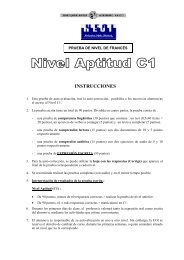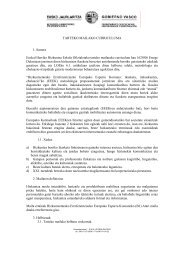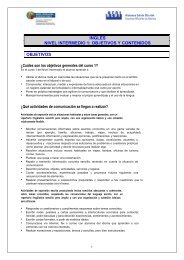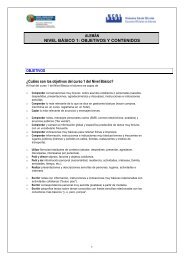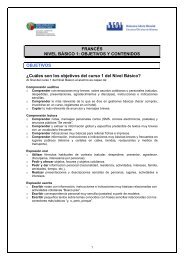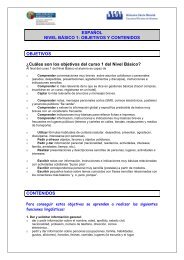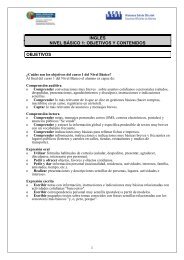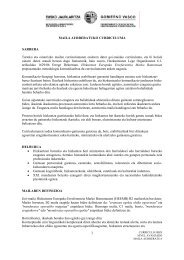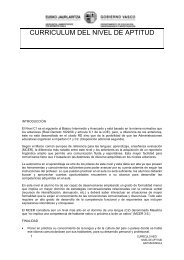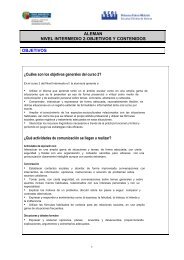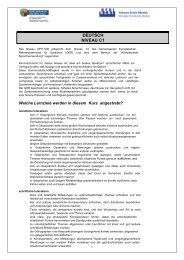C1 – Course Syllabus - Escuelas Oficiales de Idiomas del País Vasco
C1 – Course Syllabus - Escuelas Oficiales de Idiomas del País Vasco
C1 – Course Syllabus - Escuelas Oficiales de Idiomas del País Vasco
Create successful ePaper yourself
Turn your PDF publications into a flip-book with our unique Google optimized e-Paper software.
Adverbial structures<br />
Forms that may lead to confusion:<br />
To differentiate between adjectives and adverbs with the same forma and those ending in <strong>–</strong>ly.<br />
e.g. straight, fast, well, hard, fair/fairly, free/freely, late/lately, short/shortly, hard/hardly,<br />
near/nearly, fine/finely, high/highly, right/rightly, wi<strong>de</strong>/wi<strong>de</strong>ly, costly, <strong>de</strong>adly, friendly, likely,<br />
lively, lonely, lovely, etc.).<br />
Verbal structures<br />
Phrasal verbs<br />
Awareness of the five principal phrasal verb structures and the significant differences in<br />
meaning between i<strong>de</strong>ntical transitive and intransitive forms.<br />
Type -1 (verb + particle + object)<br />
e.g. look for, come across, call on, etc.<br />
Let‟s look for a place to eat.<br />
Type -2 (verb + object + particle / verb + particle + object)<br />
e.g. take off, put on, find out, etc.<br />
He took off his shoes and stretched out on the sofa.<br />
He took his shoes off and stretched out on the sofa.<br />
Find it out. I mean, find out where they‟re at.<br />
Type -3 (verb + particle + Ǿ)<br />
e.g. take off, mess around, doze off, etc.<br />
We took off on time but were <strong>de</strong>layed because of turbulence en route.<br />
Type -4 (verb + participles + object)<br />
e.g. look forward to, get on with, put up with, etc.<br />
Everyone‟s looking forward to the holidays right now.<br />
Type -5 (verb + object + participles)<br />
e.g. take_ up on, let_ in for, talk_ out of, etc.<br />
I might take you up on that offer some day.<br />
You don‟t know what you‟re letting yourself in for.<br />
Verb Tenses<br />
Present<br />
- Simple Present:<br />
- Stressing the present form<br />
To highlight or correct a fact about the present, e.g. She doesn‟t know much about physics<br />
but she does know quite a lot about chemistry; to highlight some emotion about the present,<br />
e.g. I do hate football.<br />
- Present Progressive<br />
To <strong>de</strong>scribe irritating or curious habits (often using always), e.g. He‟s always chewing gum in<br />
class.<br />
- Present perfect simple:<br />
To express the future (in time clauses), e.g. Next week has taken on a new significance.<br />
19



